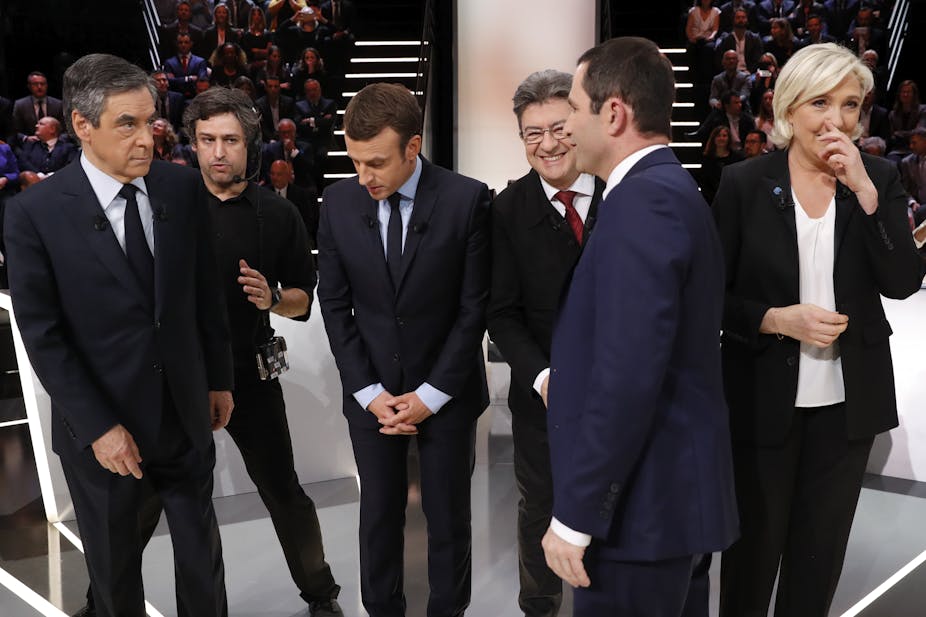The French presidential election finally began, officially, on Saturday March 18. Laurent Fabius, president of the Constitutional Council, announced the 11 candidates who have received the requisite number of endorsements for their names to go forward. Two days later and the biggest names among those candidates met in the first of three televised debates – and it proved the biggest challenge for Front National candidate Marine Le Pen.
Although all the opinion polls point to her losing the second round of the election, Le Pen remains the clear favourite for the first round on April 23. And none of her four main rivals are taking it for granted that she will lose on May 7. The television debate offered her, then, the chance to strengthen her position in and hold on the campaign. In the end, the outcome was a disappointment for her. She may be ahead in the polls, but when it comes to rhetoric and oratory, she is up against four contestants who will not yield ground easily.
The decision (taken some while ago) to limit the debate to Le Pen, François Fillon, Benoît Hamon, Emmanuel Macron and Jean-Luc Mélenchon provoked annoyance among the other candidates. But, in practical terms, it allowed the main candidates to put down their markers before the next two debates – on April 4 and 20 – which will involve all 11. It’s only in the final two weeks of the campaign that the law requires all candidates have equal TV and radio air time.
Pollsters have noticed a relatively low participation rate in this election so far. Only 65% of voters say they will definitely vote in the first round, as opposed to the 80% one would expect for a presidential election. And yet, the first debate drew an impressive average viewing figure of 9.8m, peaking at 11.5m. That’s not bad, considering that the debate started at nine in the evening and lasted three hours.
These debates are curious beasts. None of the candidates wants to commit a faux pas that will condemn them for the rest of the campaign and they have never appeared together as a group, so viewers didn’t know how the dynamics would work out.
Le Pen and Mélenchon have been here before (in 2012) and Hamon and Fillon have been through the process in the course of the primaries. Only Macron has no experience of this sort of debate, so it was something of a test of his mettle. The spotlight was also on him because he is, according to current polls, the candidate most likely to face Le Pen in the second round. In the end, he came out of it reasonably well.

Le Pen set the tone for her own approach from the outset, with an aggressive opening volley, declaring that, unlike the other candidates, she had no intention of being Angela Merkel’s vice-president in a European superstate. She continued in similar vein for the next three hours, painting a picture of a France stalked by lawless criminal bands and flooded with immigrants, seeking to consolidate her electorate rather than soften her tone in pursuit of floating voters.
This actually made it easier for her opponents, especially Macron, Hamon and Mélenchon to lay out their very different approaches to the key issues of education, law and order, and immigration. They suggested that she has overstated crime rates and insisted on France’s historical role as a country open to the persecuted and the refugee.
Fillon seemed less eager to present himself as the polar opposite of Le Pen. He didn’t go so far as to agree with her but sought to underline the tougher aspects of his own programme. He would, for example, amend the constitution to allow parliament to establish annual immigration quotas.
On the question of secularism, there was broad consensus that the 1905 law of separation of church and state is not negotiable. But the centre and left candidates ridiculed Le Pen’s proposal to, basically, prohibit the wearing of clothes that express a religious belief from all public spaces. As Mélenchon put it: “Do you want to police what people choose to wear?” The question was rhetorical, but you suspect we could guess Le Pen’s answer.
For his part, Fillon was rather subdued in the early exchanges and only really found his form when the focus shifted to the economy and international relations. If he had hoped to use the debate to re-establish his credentials as the second-placed candidate and ahead of Macron, this was not a success. Aware that their man had failed to seize the opportunity, key supporters such as senate president Gérard Larcher, spent the following morning doing the rounds of the political radio talk shows, stressing that Fillon is the only candidate who can offer France a stable majority after June’s general election and that his are the only economic policies that add up.
Le Pen found herself confounded not just by Macron, but also by Mélenchon and Hamon, who proved good foils to one another, particularly on the question of immigration – and despite their divergence on the question of the EU. Deprived of the enthusiastic public that she is used to addressing in election meetings, Le Pen couldn’t seem to land her punches. She was up against four opponents who have no intention of letting her roll them over. At the same time, Macron appeared to do enough to hold the centre line and not lose too much ground to the candidates to his left and right. In that much at least he was probably the evening’s winner.

